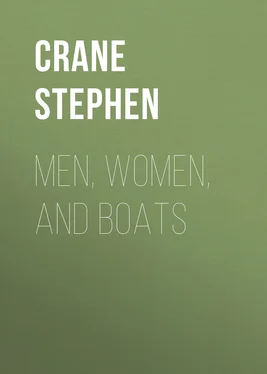Stephen Crane - Men, Women, and Boats
Здесь есть возможность читать онлайн «Stephen Crane - Men, Women, and Boats» — ознакомительный отрывок электронной книги совершенно бесплатно, а после прочтения отрывка купить полную версию. В некоторых случаях можно слушать аудио, скачать через торрент в формате fb2 и присутствует краткое содержание. Жанр: Социально-психологическая фантастика, literature_19, на английском языке. Описание произведения, (предисловие) а так же отзывы посетителей доступны на портале библиотеки ЛибКат.
- Название:Men, Women, and Boats
- Автор:
- Жанр:
- Год:неизвестен
- ISBN:нет данных
- Рейтинг книги:5 / 5. Голосов: 1
-
Избранное:Добавить в избранное
- Отзывы:
-
Ваша оценка:
- 100
- 1
- 2
- 3
- 4
- 5
Men, Women, and Boats: краткое содержание, описание и аннотация
Предлагаем к чтению аннотацию, описание, краткое содержание или предисловие (зависит от того, что написал сам автор книги «Men, Women, and Boats»). Если вы не нашли необходимую информацию о книге — напишите в комментариях, мы постараемся отыскать её.
Men, Women, and Boats — читать онлайн ознакомительный отрывок
Ниже представлен текст книги, разбитый по страницам. Система сохранения места последней прочитанной страницы, позволяет с удобством читать онлайн бесплатно книгу «Men, Women, and Boats», без необходимости каждый раз заново искать на чём Вы остановились. Поставьте закладку, и сможете в любой момент перейти на страницу, на которой закончили чтение.
Интервал:
Закладка:
"To-morrow, Saturday, the 9th, I go again to Dover to meet his body. He will rest for a little while in England, a country that was always good to him, then to America, and his journey will be ended.
"I've got the unfinished manuscript of his last novel here beside me, a rollicking Irish tale, different from anything he ever wrote before. Stephen thought I was the only person who could finish it, and he was too ill for me to refuse. I don't know what to do about the matter, for I never could work up another man's ideas. Even your vivid imagination could hardly conjecture anything more ghastly than the dying man, lying by an open window overlooking the English channel, relating in a sepulchral whisper the comic situations of his humorous hero so that I might take up the thread of his story.
"From the window beside which I write this I can see down in the valley Ravensbrook House, where Crane used to live and where Harold Frederic, he and I spent many a merry night together. When the Romans occupied Britain, some of their legions, parched with thirst, were wandering about these dry hills with the chance of finding water or perishing. They watched the ravens, and so came to the stream which rises under my place and flows past Stephen's former home; hence the name, Ravensbrook.
"It seems a strange coincidence that the greatest modern writer on war should set himself down where the greatest ancient warrior, Caesar, probably stopped to quench his thirst.
"Stephen died at three in the morning, the same sinister hour which carried away our friend Frederic nineteen months before. At midnight, in Crane's fourteenth-century house in Sussex, we two tried to lure back the ghost of Frederic into that house of ghosts, and to our company, thinking that if reappearing were ever possible so strenuous a man as Harold would somehow shoulder his way past the guards, but he made no sign. I wonder if the less insistent Stephen will suggest some ingenious method by which the two can pass the barrier. I can imagine Harold cursing on the other side, and welcoming the more subtle assistance of his finely fibred friend.
"I feel like the last of the Three Musketeers, the other two gone down in their duel with Death. I am wondering if, within the next two years, I also shall get the challenge. If so, I shall go to the competing ground the more cheerfully that two such good fellows await the outcome on the other side.
"Ever your friend, "ROBERT BARR."The last of the Three Musketeers is gone, now, although he outlived his friends by some years. Robert Barr died in 1912. Perhaps they are still debating a joint return.
There could be, perhaps, no better close for a paper on Stephen Crane than the subjoined paragraph from a letter written by him to a Rochester editor:—
"The one thing that deeply pleases me is the fact that men of sense invariably believe me to be sincere. I know that my work does not amount to a string of dried beans—I always calmly admit it—but I also know that I do the best that is in me without regard to praise or blame. When I was the mark for every humorist in the country, I went ahead; and now when I am the mark for only fifty per cent of the humorists of the country, I go ahead; for I understand that a man is born into the world with his own pair of eyes, and he is not at all responsible for his vision—he is merely responsible for his quality of personal honesty. To keep close to this personal honesty is my supreme ambition."
VINCENT STARRETT.THE OPEN BOAT
A Tale intended to be after the fact. Being the experience of four men from the sunk steamer "Commodore"
I
None of them knew the color of the sky. Their eyes glanced level, and were fastened upon the waves that swept toward them. These waves were of the hue of slate, save for the tops, which were of foaming white, and all of the men knew the colors of the sea. The horizon narrowed and widened, and dipped and rose, and at all times its edge was jagged with waves that seemed thrust up in points like rocks. Many a man ought to have a bath-tub larger than the boat which here rode upon the sea. These waves were most wrongfully and barbarously abrupt and tall, and each froth-top was a problem in small-boat navigation.
The cook squatted in the bottom and looked with both eyes at the six inches of gunwale which separated him from the ocean. His sleeves were rolled over his fat forearms, and the two flaps of his unbuttoned vest dangled as he bent to bail out the boat. Often he said: "Gawd! That was a narrow clip." As he remarked it he invariably gazed eastward over the broken sea.
The oiler, steering with one of the two oars in the boat, sometimes raised himself suddenly to keep clear of water that swirled in over the stern. It was a thin little oar and it seemed often ready to snap.
The correspondent, pulling at the other oar, watched the waves and wondered why he was there.
The injured captain, lying in the bow, was at this time buried in that profound dejection and indifference which comes, temporarily at least, to even the bravest and most enduring when, willy nilly, the firm fails, the army loses, the ship goes down. The mind of the master of a vessel is rooted deep in the timbers of her, though he commanded for a day or a decade, and this captain had on him the stern impression of a scene in the greys of dawn of seven turned faces, and later a stump of a top-mast with a white ball on it that slashed to and fro at the waves, went low and lower, and down. Thereafter there was something strange in his voice. Although steady, it was, deep with mourning, and of a quality beyond oration or tears.
"Keep 'er a little more south, Billie," said he.
"'A little more south,' sir," said the oiler in the stern.
A seat in this boat was not unlike a seat upon a bucking broncho, and by the same token, a broncho is not much smaller. The craft pranced and reared, and plunged like an animal. As each wave came, and she rose for it, she seemed like a horse making at a fence outrageously high. The manner of her scramble over these walls of water is a mystic thing, and, moreover, at the top of them were ordinarily these problems in white water, the foam racing down from the summit of each wave, requiring a new leap, and a leap from the air. Then, after scornfully bumping a crest, she would slide, and race, and splash down a long incline, and arrive bobbing and nodding in front of the next menace.
A singular disadvantage of the sea lies in the fact that after successfully surmounting one wave you discover that there is another behind it just as important and just as nervously anxious to do something effective in the way of swamping boats. In a ten-foot dingey one can get an idea of the resources of the sea in the line of waves that is not probable to the average experience which is never at sea in a dingey. As each slatey wall of water approached, it shut all else from the view of the men in the boat, and it was not difficult to imagine that this particular wave was the final outburst of the ocean, the last effort of the grim water. There was a terrible grace in the move of the waves, and they came in silence, save for the snarling of the crests.
In the wan light, the faces of the men must have been grey. Their eyes must have glinted in strange ways as they gazed steadily astern. Viewed from a balcony, the whole thing would doubtless have been weirdly picturesque. But the men in the boat had no time to see it, and if they had had leisure there were other things to occupy their minds. The sun swung steadily up the sky, and they knew it was broad day because the color of the sea changed from slate to emerald-green, streaked with amber lights, and the foam was like tumbling snow. The process of the breaking day was unknown to them. They were aware only of this effect upon the color of the waves that rolled toward them.
Читать дальшеИнтервал:
Закладка:
Похожие книги на «Men, Women, and Boats»
Представляем Вашему вниманию похожие книги на «Men, Women, and Boats» списком для выбора. Мы отобрали схожую по названию и смыслу литературу в надежде предоставить читателям больше вариантов отыскать новые, интересные, ещё непрочитанные произведения.
Обсуждение, отзывы о книге «Men, Women, and Boats» и просто собственные мнения читателей. Оставьте ваши комментарии, напишите, что Вы думаете о произведении, его смысле или главных героях. Укажите что конкретно понравилось, а что нет, и почему Вы так считаете.












